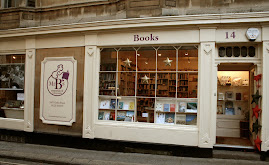 We liked Mari Strachan's debut novel, 'The Earth Hums in B Flat' so much that we've invited her to come and talk about it at Mr B's on 16th September (www.mrbsemporium.com/events.htm). We're so excited about her impending visit that we've asked her a few taster questions. Here's what she had to say.....
We liked Mari Strachan's debut novel, 'The Earth Hums in B Flat' so much that we've invited her to come and talk about it at Mr B's on 16th September (www.mrbsemporium.com/events.htm). We're so excited about her impending visit that we've asked her a few taster questions. Here's what she had to say.....Mr B: One of the things I loved about the 'The Earth Hums in B Flat' were the smaller characters who made the small-town Welsh community come alive. Do you have a favourite of those non-central characters and if so would you describe him/her in a few words?
 Mari: I loved writing all the ‘smaller’ characters: each one had a history, although it never appeared in the book, but I guess it informed the character and made that character into a real person. My favourite is the farm-wife at Penrhiw Farm, Bessie Williams, with her soft and scented bosom and her non-stop talking. She’s lived at the farm since she was married and she’s of the same generation as Gwenni’s grandmother. She’s bewildered by all the changes that are taking place and uncomfortable with them. The farm is a little way outside the town and she doesn’t see anybody for days on end sometimes so when she’s in company she can’t stop talking. I see her as the Greek chorus in the book; she has a little speech in each of the three parts where her comments on what’s happening are spot on. I loved writing her, I thought she was kind and caring, and, although her appearances are few, I felt that she played an important role in the book as a comic character and as a commentator.
Mari: I loved writing all the ‘smaller’ characters: each one had a history, although it never appeared in the book, but I guess it informed the character and made that character into a real person. My favourite is the farm-wife at Penrhiw Farm, Bessie Williams, with her soft and scented bosom and her non-stop talking. She’s lived at the farm since she was married and she’s of the same generation as Gwenni’s grandmother. She’s bewildered by all the changes that are taking place and uncomfortable with them. The farm is a little way outside the town and she doesn’t see anybody for days on end sometimes so when she’s in company she can’t stop talking. I see her as the Greek chorus in the book; she has a little speech in each of the three parts where her comments on what’s happening are spot on. I loved writing her, I thought she was kind and caring, and, although her appearances are few, I felt that she played an important role in the book as a comic character and as a commentator.Mr B: If you had Gwenni’s tendency to fly at night and you swept over a literary event and saw yourself giving a reading from 'The Earth Hums' and answering questions, what interesting question would you want to hear an audience-member ask you that you haven’t had up until now?
Mari: This is cheating a bit – but I’ve just had a question (one among many!) from an Italian magazine (EH is to be published in Italy in September) which no-one has asked before about an aspect of the book of which I was not particularly aware. And this is it:
‘Gwenn, Bethan, Mam, Nain, Elin Evans, Alwenna, Catrin and Angharad etc...... The central and most relevant actors of the novel are women. Women who act, take decisions, make mistakes, bring on the plot of the novel..... It sounds that men are mostly "spectators", they watch and suffer the consequences of women's acts (like Tada, for example). What can you say about that?’
Well, what can I say about that? It’s fascinating isn’t it? I’ll have thought hard about it and will have written the answer by the 16th September and, if you like, I’ll share it with you all then and see what you think!
I’m very much looking forward to my visit to Mr B’s Emporium and to meeting you all and answering any questions you may have.

































